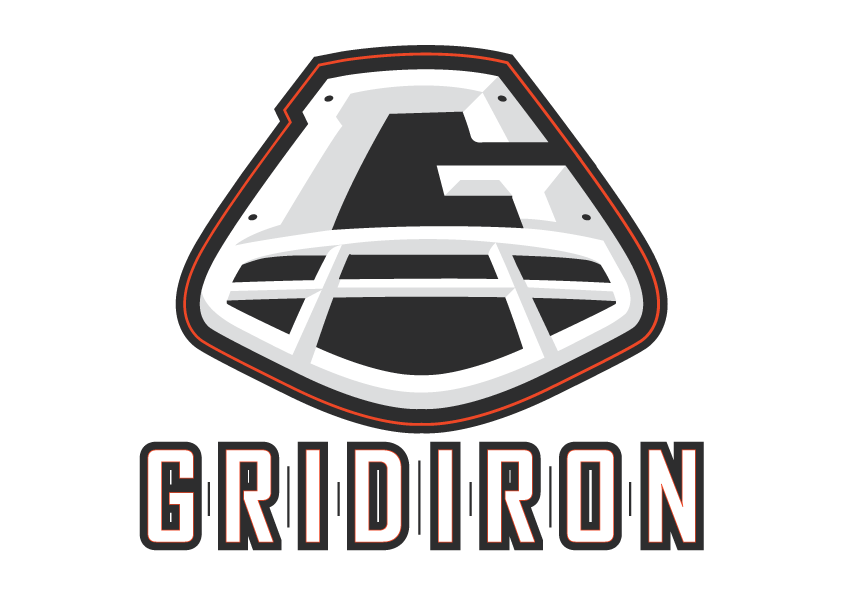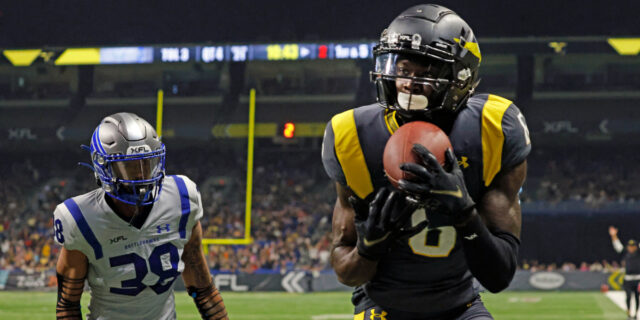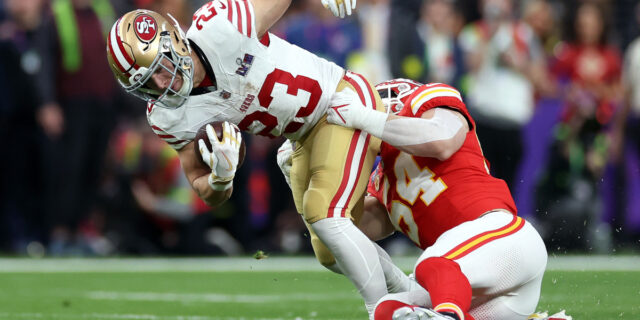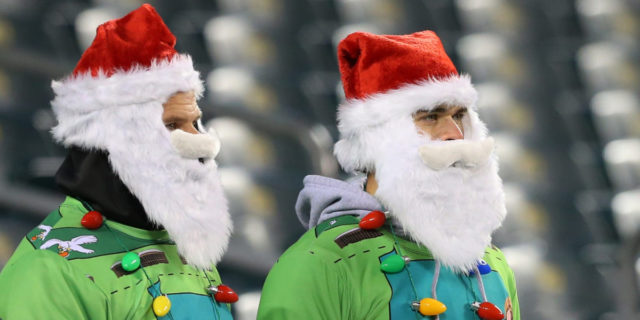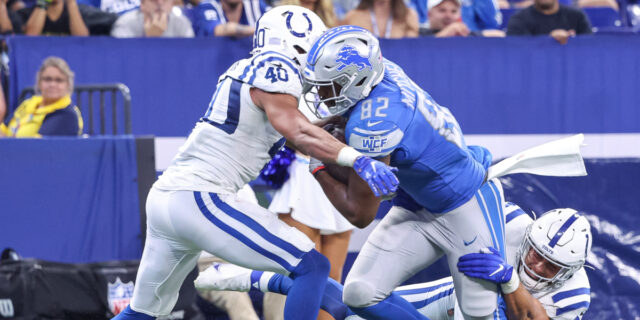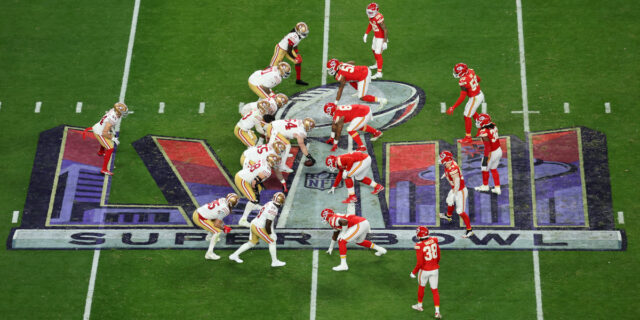
From Takedowns to TV
This article originally appeared in Issue XXVII of Gridiron magazine back in 2016 – for individual editions or subscriptions, click HERE
The studios where the BBC’s NFL presenter, Mark Chapman, hosts his 5 Live Sport radio programmes from are shrouded in dim light. It’s his ‘thing’. There’s rain in the air in Manchester on this evening which adds to the sense of gloaming around the place. Outside the glass that separates us from the rest of the world, Stoke midfielder Charlie Adam stands talking to Joey Barton: Chapman’s Monday Night Club football programme is due to begin in under half an hour, but you wouldn’t know it. There’s a sense of calm and control as the 43-year-old sits in front of his screen, casually eyeing up scripts for the three-and-a-half hours that lay ahead. Here, there’s no sense of the wonderful pandemonium that accompanies his NFL shows. A pandemonium brought on most often by one man who’s transposed from one hugely successful career to another with barely a break of stride.
“We were in Minnesota last week, watching the Thursday-nighter between the Vikings and the Cowboys,” Chapman tells Gridiron. “And Osi’s pounding on the left tackle, T.J. Clemmings, who was getting abused all game. And I’m laughing because he’s really giving the guy a hard time, and Osi’s laughing as well, telling me what he’s doing wrong and why he’s getting beaten every play. Then he goes quiet and eventually he turns to me and says, ‘I did used to know what I was doing you know. I didn’t just turn up and clown around’.”
“And that’s the point with him,” Chapman continues. “He looks like he’s having fun because he is. But he also works damn hard. He’s not making this up as he goes along. And there’s a confidence there, the sort of confidence that comes with having two Super Bowl rings. And it shows.”
Now I must caveat the rest of this story: I work closely with Chapman at 5 Live and have done for many years. And part of my job is to try and find people like Osi Umenyiora and put them on air: confident, well-spoken, interesting former sportsmen and women who can help bring big games or conversation alive with their knowledge. People criticise ex-professionals who go into the media on a daily basis: social media can become something of an echo chamber during a major sporting event. Just ask Phil Neville. But the key to the transition from field to freeze frame, from court to camera is two-fold: tell me something I don’t know, and take me somewhere I’ve never been. For all the opinions of the man and woman in the street, there’s only a small handful who’ve stood over a putt to win a golf major, scored in a Champions League final, or sacked Tom Brady in a Super Bowl. Having that sort of person is manna from heaven to someone like me. To have someone who does it as well as Osi Umenyiora does?
You can write your own cheques.
“The problem was Umenyiora had no real desire to [take up football]. But when you’re 14 and 251lbs in the state of Alabama, it’s tough to avoid.”
Born in Golders Green, Umenyiora’s formative years were spent in Nigeria. His first ‘taste’ of American football came on a gift from his stepmother: a white blanket adorned with little one-eyed men in silver and black helmets. Only after he’d turned 14 and moved to the States did he understand who these characters were.
Watching television on a Sunday afternoon at his new home in Auburn, Umenyiora stopped on a channel showing athletes running into each other. One group of players were wearing the same silver-and-black helmets with the little men on the sides. “I finally realised then who they were,” he says. “The Oakland Raiders.” He’d been sent to America to further his education rather than play sports, but the game he saw on the screen intrigued him.
“My older brother and his friends would come over to the house and we’d play about. I was naturally gifted and they could see I was a really good athlete,” he said. “So they suggested I took up football.” The problem was Umenyiora had no real desire to do so. But when you’re 14 and 251lbs in the state of Alabama, it’s tough to avoid. A year later he was playing defensive end for Auburn High School. Or at least trying to. “The first day, I remember everybody was on the field for practice, except Osi,” says Clay McCall, then the school’s defensive line coach. “I went to the locker room and saw him standing there with his pads next to him. He didn’t even know how to put them on.”
But he was a fast learner and by his senior year he was heading to Auburn to enrol and perhaps walk-on for the Tigers, until a chance meeting with former All-American defensive tackle Tracy Rocker — who was scouting for Division 1-AA Troy University — changed everything. “I’m gonna to play for you,” he told the former Outland and Lombardi Trophy winner, “I’m gonna play for you!” Intrigued, Rocker pulled up his tape and saw a defensive end who couldn’t get to the quarterback no matter how hard he tried. But he also saw effort and hustle and heart. And so he took a chance. Umenyiora was headed 13 hours up Interstate 75 to the small city of Troy.
“This guy can run. This guy can fly off the edge — and he’s not a little guy either.”
College football didn’t come easy to the athletic freak with the British accent and, by the midway point of the 2002 season, after flipping from tackle to end and back again, he’d recorded zero sacks in three-and-a-bit seasons. The fire that Rocker had seen on film had made him a factor on special teams but, as a pass-rusher, he was impotent. Then, on an October afternoon in West Virginia as Troy took on Marshall during his senior year, Umenyiora exploded onto the nations consciousness. Lined up against tackle Steve Sciullo, who hadn’t given up a sack in two years and would go on to be a fourth-round pick of the Colts, he beat him for speed off the edge and nailed Byron Leftwich for his first career takedown. It would be the catalyst: by season’s end, he had 15 more as he and sophomore DeMarcus Ware terrorised quarterbacks.
Those numbers put him firmly on the NFL’s radar and, despite not getting an invite to the combine, one team were especially keen: the New York Giants. “We’d targeted him from a long way out,” said player-personnel director Jerry Reese after making Umenyiora the 46th overall pick in the 2003 draft. “This guy can run. This guy can fly off the edge — and he’s not a little guy either.” Reese was right. Eleven seasons later, he’d retire with two Super Bowl rings, 75 sacks, two Pro Bowls and a place in the Giants’ prestigious Ring of Honour. But, at 33, he faced a crossroads: what next?
“The atmosphere isn’t fake. It’s exactly the same off screen as it is on. The show’s an extension of what we do off air and that’s crucial. The only difference is that the cameras are running.”
Well initially, ‘what next’ didn’t mean broadcasting. “I just think that most players try to go the more traditional route, into the media, and I didn’t want to do that,” said. “I thought coming back here and being on the ground for a project that will turn into something special was a better opportunity than just trying to be one of a thousand people who are doing the same thing in America.” ‘Back here’ was London where Umenyiora had begun work as the NFL’s ambassador to the UK. In typical Osi style, he took it very seriously: “This is what I’ve dreamed about,” he said. “Being in the league was important for me to understand the magnitude of my job, to provide for my family and knowing that, as long as I performed at a high level, I was going to stay in the game and stay focused on the task at hand. Just like here.”
And then the game changed again.
The BBC, who’d been losing a number of television sports rights because of increasing competition and inflating prices, won a contract for live International Series games and a highlights show called The Road To The Super Bowl. But it needed to pull in audiences, especially 15-35 year olds. It also needed gravitas and something a little bit different. It needed Umenyiora. “That was always the goal when he came over,” said Mark Waller, the NFL’s executive vice president of international. “We wanted him to have the chance to be the face of the sport with our broadcast partners.”
The face of the sport is right. The BBC’s NFL shows have gone from strength to strength since the initial run last season. Two highlights programmes sit comfortably on the schedule with Chapman as the front man, alongside former Dallas corner Jason Bell and Umenyiora. If Chapman is the conductor, then Bell’s the orchestra and Umenyiora the music. And it’s a hell of a sound.
“Without wanting to criticise all British pundits, there’s something about Americans that mean they just ‘get it’. They’re fully up to speed and that’s what Osi is,” Chapman tells Gridiron. “This is the show I enjoy doing more than any, for a variety of reasons. But he’s a very large one.” Remarkably the three of them had never met until a few hours before their first show back in 2015, which is extraordinary given the camaraderie between them and the relaxed air that bleeds through the screen. “The atmosphere isn’t fake,” says Chapman. “It’s exactly the same off screen as it is on. The show’s an extension of what we do off air and that’s crucial. The only difference is that the cameras are running.”
So is he surprised at how quickly Umenyiora has taken to television? “I’m very surprised. I’ve only worked with one other person who’s been so good so quickly at the two things and that’s Michael Vaughan. They both have great comic timing and an ease about them when describing a technical point. Take Match of the Day 2 (which Chapman also presents). Alan (Shearer) and Jermaine (Jenas) are great, but they’ve had to grow into their roles a little bit. Osi just got it from minute one.” And the audience love it. The Saturday programme attracts almost a million more viewers than Football Focus and, crucially, has a larger percentage of under 35 viewers than any other BBC1 show.
By now, the start of the Monday Night Club is only minutes away, but Chapman is keen to tell me more. It’s obvious how proud the veteran broadcaster is of their little televisual baby and he beams when announcing that the two former players refer to him as ‘our quarterback’. By this time, Adam has sat down and is listening intently. “The biggest thing is that my lad watches it and he does so because he likes it, not because of me,” says the man Umenyiora and Bell have dubbed Russell Roethlisberger for this season. “If it could have the effect that Channel 4 had for the game in the ‘80s then that would be great — and I say this as someone who takes a keen interest in the heritage of sports broadcasting. And, if we do so, it’ll be in large part because of Osi.”
Osi Umenyiora was born Ositadamma Umenyiora. It’s an Igbo name, borne of the indigenous people of Southern Nigeria of which he’s one. His name means, “from today on, things will be good”. If I know television producers like I think I do, there’ll have been similar words spoken in the gallery when the former New York Giant uttered his first words on the BBC. The show is smart, refreshing, inclusive, knowledgeable and fun.
Somehow, Umenyiora is even better.
This article originally appeared in Issue XXVII of Gridiron magazine back in 2016 – for individual editions or subscriptions, click HERE
